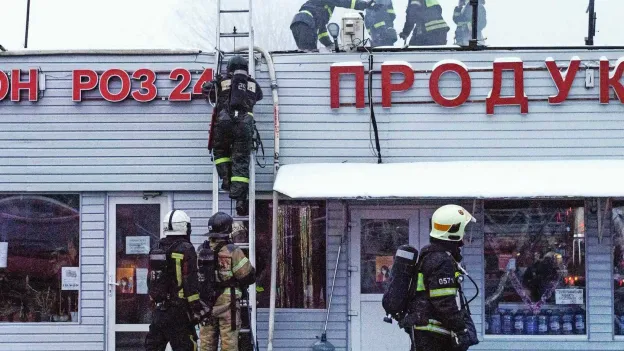
Wave of Mysterious Arson Attacks in Russia Linked to Elderly Perpetrators

amsterdam - Russia is facing a wave of arson attacks, predominantly carried out by retired Russians targeting banks, post offices, and police cars. The Kremlin is pointing fingers at Kiev for the escalating situation.
Since the Russian invasion of Ukraine in February 2022, a series of arson attacks have been occurring in the country. According to a forthcoming investigation by Russian independent news site Mediazona, at least 280 cases have been reported since the outbreak of the war.
Initially, during the first year of the conflict, the targets were mainly recruitment agencies and police stations, with clear ideological motives traced back to anti-war activists or opponents of Russian mobilization. However, in recent times, the focus has shifted to simpler targets, with a noticeable change in the profile of the perpetrators. Interestingly, last December, it was often retired Russians who, after their arrest, claimed to have been deceived over the phone.
An example cited is Alexander Nikiforov, a pensioner who set multiple ATMs on fire just before Christmas by soaking a newspaper in alcohol and igniting it on top of the machine, filming the acts with his phone each time. The spree ended with his arrest in a suburb of St. Petersburg. Nikiforov claimed to have received instructions from unidentified phone scammers, misleading him into transferring large sums of money and then setting ATMs ablaze to reclaim the money.
Despite the explanations provided by Nikiforov, his legal prospects seem grim. He is being prosecuted for terrorist crimes, and as per The Economist, only 0.26 percent of the accused individuals in Russia receive acquittal. Dmitry Zakhvatov, a lawyer, commented, "It is impossible to defend people in Russia, regardless of whether they have been deceived or not."
Although the elderly scammers are being prosecuted, the Kremlin strongly believes that Ukraine is the actual culprit behind the arsons, citing motives and means. In response, Moscow announced a ban on internet telephony late last year.
Just before that, the Kremlin had made accessing YouTube almost impossible by significantly reducing the site's speed in Russia. Meduza, an independent news site, reported that the disruptions began in the summer of last year, escalating in December. On December 23, the director of the non-profit organization Internet Protection Society, Mikhail Klimarev, declared on his Telegram channel, "YouTube has effectively been blocked in Russia."
While the Russian accusations may not be unfounded, The Economist highlights Ukraine's longstanding history as a "world leader in the phone fraud industry," with numerous obscure call centers operating from cities like Kiev and Dnipro.
Since the shadow war between Russia and Ukraine began in 2014, both countries have severed law enforcement cooperation. Russian citizens have reportedly been the primary targets of Ukrainian criminal activities, aided by the high level of corruption in Russia, making significant amounts of personal data of Russians available on the dark web. The Ukrainian bilingualism has also been advantageous in these operations.
A source from Ukrainian justice informed the British weekly that such call centers may have played a role in the recent spate of arsons. "They employ skilled psychologists who can manipulate the vulnerable. Their main motivation is money, but they can occasionally serve the homeland as well."
However, intelligence sources contradict this narrative. "Ukraine's special services are at work," a source claimed. "It is a routine operation."
Furthermore, the same source dismissed claims that the elderly Russian arsonists were unaware of their actions. "When people get caught, they say anything. They were drunk, given food, or injected with something. But you can get a grandmother to throw a Molotov cocktail at a military office as long as your price is right."


Leave a comment